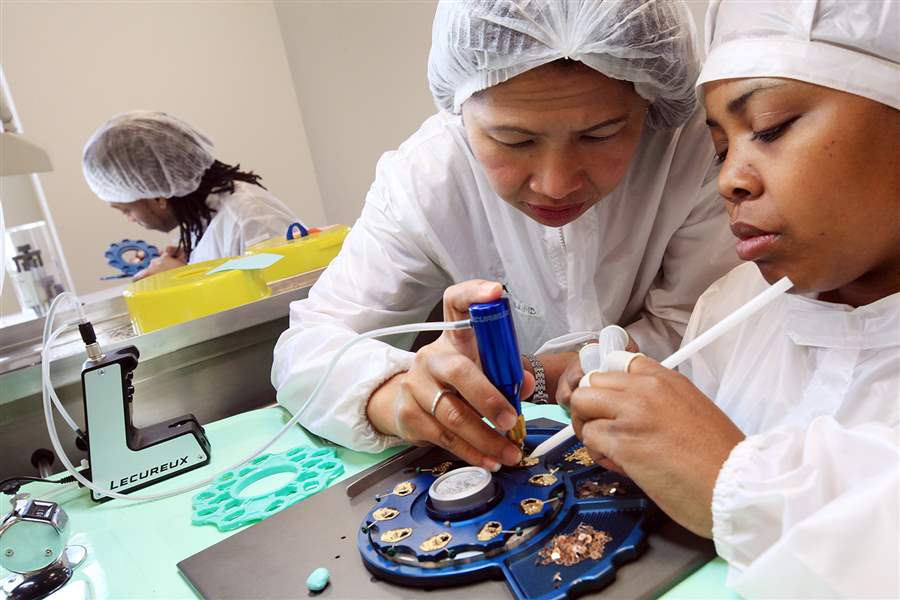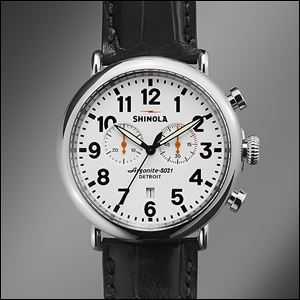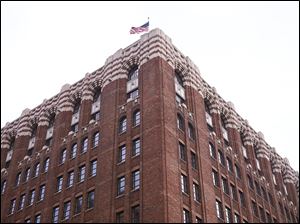
Upscale watch company keeps on ticking in Detroit
Shinola among few brands to produce in North America
12/15/2013
Tanyapat Jakaew, left, and Judith Walker work on the minute wheels for a 1069 Argonite watch at Shinola’s manufacturing site in the Argonaut Building in Detroit. The firm was founded in 2011 and began making watches earlier this year.
DETROIT FREE PRESS

Tanyapat Jakaew, left, and Judith Walker work on the minute wheels for a 1069 Argonite watch at Shinola’s manufacturing site in the Argonaut Building in Detroit. The firm was founded in 2011 and began making watches earlier this year.
DETROIT — The people behind Shinola simply want to produce quality, smartly styled watches that will last generations.
“We’re not out to turn the world upside down,” Steve Bock, the company’s chief executive officer, said in a recent interview.
But by making its upscale timepieces in Detroit, that’s essentially what Shinola has done.
America used to have big watch companies. There were Hamilton and Elgin, Benrus, and Bulova. Those brands are still on jewelry store shelves, but only the Elgin brand is American-owned. And none of those watches is made in North America.
A handful of boutique American watch companies have sprung up, some of which have developed strong reputations. However, their production is extremely limited. It’s been a long time since a company made any quantity of watches in the United States.
Shinola looks to change that. The company, which was founded in 2011, began making its watches earlier this year. Mr. Bock said Shinola — which takes its name from the old shoe-shine brand — has a production capacity of 40,000 to 50,000 watches a year. Company officials say the factory in Detroit’s New Center area north of downtown already is struggling to keep up with demand.
Shinola has 174 employees and is growing. Of those, 144 work in Detroit, with 70 working in manufacturing.
A company spokesman declined to say what the company pays its line workers, saying the private company doesn’t discuss wages publicly.
However, Shinola employees and others said pay can range from $12 for entry-level workers brought in on a temporary basis up to $17 per hour for established workers.
“The goal is to pay people a livable wage,” one employee said.
Detroit long has been known as an industrial center in America, and that’s one of the primary reasons why Shinola’s owners wanted to be there. The team behind the company visited Detroit several times and found a community that they believed would help them be successful, though they didn’t ask for or receive any public financing or tax breaks.
They believe the value of the Detroit name is enough. And it’s on the dial of every watch they produce.
While Shinola has given Detroit a shot in the arm, local officials say a similar company could do well in Toledo.
Toledo Area Chamber of Commerce executive vice president Wendy Gramza, who has been involved in multiple northwest Ohio economic development efforts, said there are no impediments in the Toledo area that would prevent a company like Shinola from setting up an operation here and succeeding.
“Our ability to design, manufacture, and distribute goods is unparalleled. I can’t imagine that there is anything out there that we couldn't make,” Ms. Gramza said.
Making watches is a very different kind of manufacturing than Detroit is used to. Instead of physical strength, watchmaking is tedious work that requires a steady hand.
“The challenge is that there has to be a certain level of dexterity,” Mr. Bock said.
In fact, the company says a job candidate’s educational background is not as important as a positive attitude and other attributes.
“We are much more concerned about dexterity and the ability to concentrate and work with small movements,” Mr. Bock said.
A watch movement can contain anywhere from 40-100 pieces, including wheels as small as a grain of sand.
Among the qualifications listed on many of the job openings posted on the company’s Web site — www.shinola.com — there is no mention of a high school or college degree.
There has been no shortage of job applicants.
“We are meeting with and talking to people every week,” Mr. Bock said. “There is a great demand for jobs in Detroit, and we are hiring people every week.”
The company’s employees come from a wide variety of backgrounds. Some are veterans of the auto industry, but others have ranged from a former cosmetologist to a onetime engineering student.
Shinola buys components for the quartz movement from Ronda Ltd., a well-respected Swiss manufacturer that supplies many other watch companies around the world. Workers at Shinola’s factory assemble the components in Detroit.
Shinola has worked with Ronda’s experts to train its diverse work force.
“We’re very lucky through our relationship with Ronda; we have arguably the most cutting-edge equipment for a watch assembly factory in the world. We have that in Detroit today,” said Mr. Bock, Shinola’s chief executive officer.
Watches obsolete?
Plenty of people say nobody wears a watch anymore. But that’s simply not true.
Research from Euromonitor International Ltd. finds U.S. consumers will spend $8.3 billion on watches this year, a 6 percent increase from 2012. Growth has been fueled by a renewed interest in high-end timepieces, as well as watches from high fashion brands such as Burberry and Michael Kors.
A fairer assessment might be that nobody needs to wear a watch anymore.
“When we talk about watches, this is a totally useless product nowadays,” said Iryna Pentina, chair of the Marketing Department at the University of Toledo’s college of business and innovation. “You can keep time on your phone, your car, your computer, your mobile device.”
Because of that, watches have become an accessory. That makes the story behind the timepiece more important. Watches are a fashion statement. A luxury item. For some, they’re a subtle way to let the world know that you’ve made it.
“There’s really few accessories that a man can put on that tells the world he’s successful. A watch happens to be one of those things,” said Jeffrey Mann, a Toledo jeweler who operates a shop on Monroe Street.
For men, Mr. Mann’s store carries only Breitling, a company with an aviation heritage and one of the better-known luxury brands. Prices start around $3,000 and escalate quickly.
Hitting fun spot
Shinola’s watches start at just less than $500, with prices going up to $1,000 for a new limited edition watch that honors the Wright brothers. Most, however, are in the lower end of that range.

Detroit is known for its autos and music, and not its watches. Shinola wants to change that, setting up production without asking for or receiving public financing or tax breaks.
The watches have a classic, streamlined look but a larger, modern size. There are four main models, though they come with a variety of dial colors and case finishes.
“I think Shinola may hit a fun spot in the market,” Mr. Mann said. “It’s made in Detroit. It’s one of the few watches that apparently is American-made. That’s something that’s been long gone from the watchmaking industry.”
Shinola says they’re not looking to compete with the likes of Rolex or Breitling, companies that charge more for many of their offerings than you paid for your first car. Or, in the case of the $40,000 Rolex Sky-Dweller, more than you paid for your current car.
While $500 may still be more than many people would ever even think of paying for a timepiece, Mr. Bock said Shinola doesn’t want to be seen as an elitist brand. And it’s hard to imagine it as such, considering the brand has embraced the old colloquialism about not knowing (something The Blade won’t print) from Shinola.
Instead, Shinola wants potential buyers to see its products as a good value. Mr. Bock said Shinola’s design, movements, and craftsmanship are on par with watches that retail for two to four times as much.
The difference in price, he said, isn't about quality. It’s about marketing.
“We’re not supported or marketed through a famous sports person, or star, or a model,” he said. “The idea here is we want to provide the consumer a very compelling value, inherent in the product.”
Shinola is getting the word out by advertising in upscale publications as well: in the Financial Times’ slick “How To Spend It” supplement and a glossy New York Times advertising section.
Iconic Detroit
The company is owned by Bedrock Manufacturing, a Texas firm that is owned by Tom Kartsotis, the man who founded Fossil Inc., which makes watches and other accessories. But Detroit is where Mr. Kartsotis wanted Shinola to be. Mr. Kartsotis reportedly commissioned a study that found people willing to pay more for a product made in Detroit.
Mr. Bock, Shinola’s CEO, doesn’t try to whitewash Detroit’s troubles. They’re real, they're out there, he said, and they’re part of the national discussion about today’s Motor City.
But that’s not the only Detroit.
“If you look at Detroit from another perspective, it really is an iconic city,” Mr. Bock said.
Detroit has been a center of finance and craftsmanship, and it produced cars and music. Shinola says the city is recognized and valued for that by retailers around the world.

Shinola makes its watches in 60,000 feet of space inside the Argonaut Building, which used to belong to General Motors, north of Wayne State University. The firm also makes bicycles and leather goods. Shinola now has the capacity to make 40,000 to 50,000 watches a year, with space eventually to make 500,000 watchesannually.
Shinola’s factory is located in 60,000 square feet of what used to be known as General Motors’ Argonaut Building north of Wayne State University. Shinola says it has the space to produce eventually up to 500,000 watches a year. The company also makes upscale bicycles and leather goods, such as writing journals, in Detroit.
Willy Shih, a professor at the Harvard business school who studies manufacturing, believes Shinola may be able to succeed but said it’s not a slam dunk by any means.
Still, he understands why they chose Detroit.
“There’s a heritage of manufacturing there. It’s where Henry Ford pioneered the assembly line,” he said.
Mr. Shih thinks Shinola’s best bet is to focus heavily on the fact that they’re making something of value in Detroit.
“They need to do a great job selling that story, because in my mind that watch as much as anything is about the story,” Mr. Shih said.
American resilience
Because Shinola is priced in somewhat of a gap between what the average consumer wants to pay for a wristwatch and the starting point for top-tier luxury brands, that story is even more important, UT’s Ms. Pentina said.
“The image they have to create for themselves, this positioning, is the symbol of American resilience,” she said. “The fact they located in Detroit — they didn't have to — it’s coming back up. I think that should appeal to the American population.”
Shinola sells online and has its own retail stores in Detroit, Kansas City, and New York City. The company plans to open a store in London next year and wants to further expand its international reach.
The company’s watches are also available in more than 200 stores across the United States, including upscale retailers Nordstrom and Bloomingdales. No stores in the Toledo area currently sell Shinola watches.
Mr. Mann, the Toledo jeweler, thinks Shinola should do especially well in Midwestern markets where “made in America” carries a little more weight. While he thinks it’s unlikely “American Made” will ever carry the same weight as “Swiss Made,” he believes there’s a place in the market for Shinola.
Mr. Mann said he has considered reaching out to the company about becoming a retailer.
“I think it would be fun for me to carry them,” he said.
Contact Tyrel Linkhorn at tlinkhorn@theblade.com or 419-724-6134.